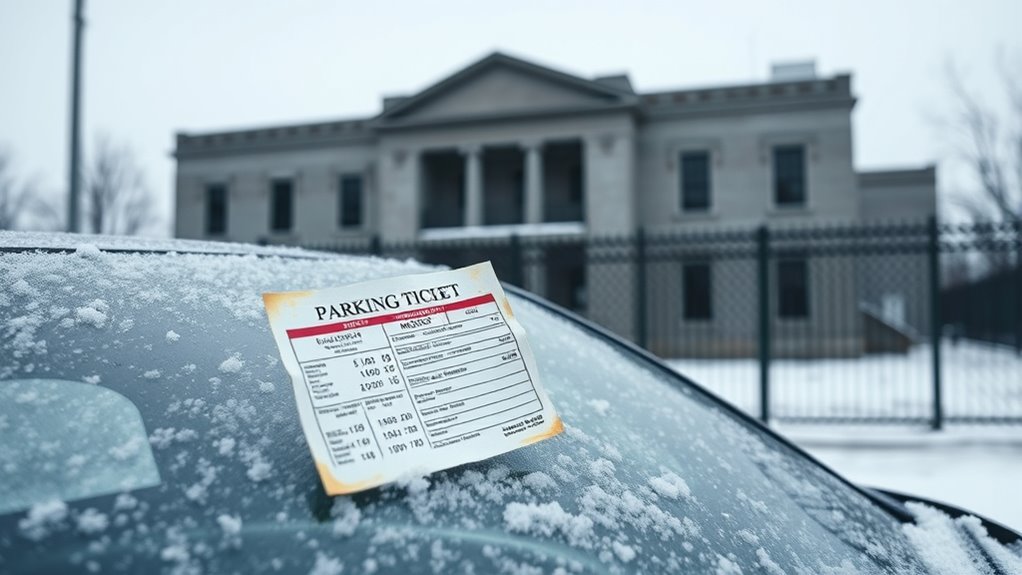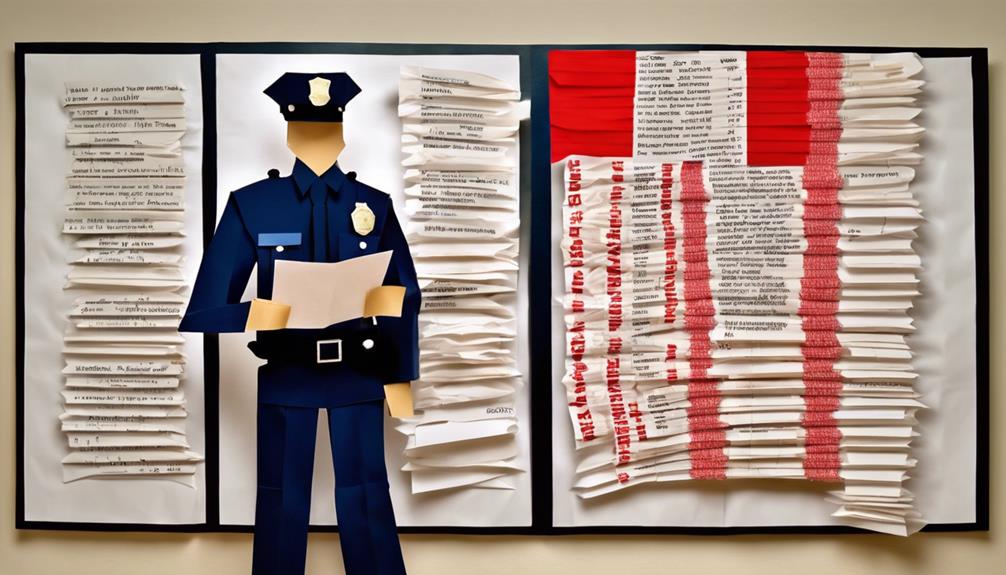Ignoring minor warrants for unpaid parking tickets or missed court dates can quickly escalate, leading to arrest, detention, and hefty fines. Law enforcement can run background checks during routine stops, uncovering active warrants that result in immediate action. As you delay resolving these issues, you risk not only jail time but also longer-term legal and financial complications. Understanding these consequences and how warrants snowball into serious trouble can help you avoid costly mistakes—more details are just a step away.
Key Takeaways
- Ignoring parking tickets or minor infractions can lead to warrants, which may result in arrest or detention.
- Warrants are public records, making law enforcement aware of unpaid tickets or missed court dates.
- Enforcement actions for warrants can escalate small issues into arrests, fines, or jail time.
- Delaying resolution of warrants increases legal complications and costs, potentially affecting your criminal and financial records.
- Promptly addressing warrants helps prevent minor infractions from snowballing into serious legal consequences.

Have you ever wondered what happens when someone issues a warrant? It might seem like a simple administrative step, but it sets off a chain of events that can drastically affect your life. When a warrant is issued—whether for unpaid parking tickets, missed court dates, or minor infractions—you’re fundamentally being formally summoned by law enforcement to address a legal matter. Ignoring it can lead to more serious legal repercussions, which escalate the situation far beyond the initial issue. The moment a warrant is active, law enforcement agencies are authorized to take enforcement actions against you, including arresting you on sight or detaining you until the matter is resolved. This is why it’s vital to understand the implications of warrants and how they can snowball from minor infractions into major legal challenges.
Once a warrant is issued, it becomes part of a public record, and law enforcement agencies across jurisdictions are alerted to your status. This means that whether you’re pulled over for a traffic stop or involved in another incident, officers are likely to run a background check and discover the warrant. If a warrant is related to unpaid parking tickets or missed court dates, the enforcement actions can include arrest warrants, which can lead to immediate detention. Even if the original violation was minor, the legal repercussions of ignoring the warrant can be severe, including additional fines, court appearances, or even jail time. It’s not just about getting stopped; it’s about the potential for your entire record to be affected, making future legal or financial issues more complicated.
Furthermore, the process of warrant enforcement often involves multiple agencies working together, which can complicate and prolong the resolution process. This escalation from a small infraction to a warrant-driven arrest can seem disproportionate, but the law treats these warrants seriously. Enforcement actions are designed to ensure compliance with legal obligations, but they also serve as a warning that neglecting small issues can lead to bigger consequences. Once in custody, you may face additional penalties, such as increased fines or extended jail time, especially if the original matter remains unresolved. This creates a snowball effect—what started as a minor oversight or missed payment can turn into a criminal charge or a costly legal battle. It’s a reminder that ignoring a warrant doesn’t make it go away; instead, it often makes the situation worse.
Understanding the legal repercussions of warrants and the enforcement actions they trigger is vital. The system is designed to uphold law and order, but it also emphasizes the importance of addressing legal issues promptly. When you ignore a warrant, you’re risking more than just a fine—you’re risking your freedom and future stability. The longer you delay, the more complicated and costly the consequences become. Being proactive, understanding the process, and resolving warrants quickly can help prevent minor issues from snowballing into serious legal problems. Recognizing the importance of law enforcement procedures can help you better navigate these situations and avoid unnecessary complications.
Frequently Asked Questions
Can Warrants Be Issued for Unpaid Parking Tickets Alone?
Yes, warrants can be issued for unpaid parking fines alone. If you ignore parking fines, the warrant process can begin, leading to a court order for your arrest. This often happens because unpaid fines are considered violations, and authorities may issue a warrant if those fines remain unpaid after notices. It’s best to address parking fines promptly to avoid the risk of warrant issuance and potential jail time.
How Long Does It Take for a Warrant to Lead to Jail?
When a warrant is issued, it can lead to jail quickly, especially if you miss court dates or ignore legal notices. If you have probation violations or license suspensions related to unpaid tickets, authorities may prioritize arresting you sooner. The timeframe varies, but once a warrant is active, you could be taken into custody within days or weeks, depending on local enforcement and your specific circumstances.
Are Warrants Always Public Information?
Warrants are like open books in a library, easily accessible to the public, but not always. While some warrants are public record, privacy concerns mean law enforcement access varies. Not every warrant is posted online or displayed, so you might not always see them. It is crucial to understand that warrants can be confidential, and only authorized personnel or agencies typically access them, balancing transparency with privacy rights.
Can Warrants Be Cleared Without Appearing in Court?
You might wonder if warrants can be cleared without appearing in court. In some cases, you can resolve warrants through warrant enforcement programs or by paying fines, which can help you avoid legal consequences and court appearances. However, this isn’t always possible, especially if the warrant is for serious charges. It’s best to check with your local authorities or a legal professional to understand your options and prevent further issues.
What Are the Long-Term Effects of Unresolved Warrants?
Unresolved warrants can lead to serious long-term effects, including legal consequences like arrest and potential jail time. You might also face increased financial liabilities from fines, court costs, and penalties. These issues can hurt your credit score and make it harder to secure loans or housing. Ignoring warrants only worsens the situation, so it’s best to address them promptly to avoid escalating legal and financial problems down the line.
Conclusion
Ignoring a small warrant might seem harmless, but it can snowball into a nightmare you can’t escape. One missed ticket could lead to a mountain of warrants, each more impossible to ignore than the last. Before you know it, you’re staring down the barrel of jail time, fines, and a record that follows you forever. Don’t let a tiny mistake turn into a lifetime of trouble—address warrants the moment they appear, or risk facing consequences that are utterly out of your control.









